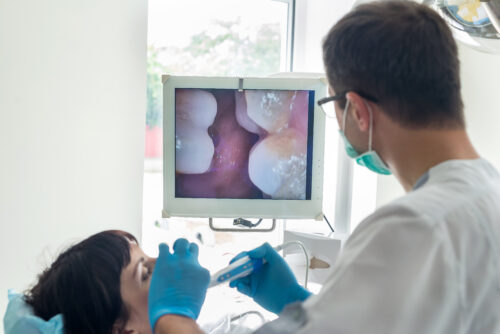
Cavities are one of the most common tooth problems that people experience. If you’ve never had a cavity, you may not know how to recognize one. When left untreated, cavities can require a root canal or an extraction that may require a crown or a dental implant. They can cause infections and lead to tooth loss. As such, it’s crucial to know the symptoms of a cavity to see when you have one to prevent it from worsening. If you suspect you have a cavity, schedule an appointment with our dedicated New Jersey Dental Team, who can help you improve your oral health. Please continue reading to learn the most common symptoms of a cavity.
What Are Cavities?
Small holes or openings form when the hard outer layer of the tooth (enamel) is damaged. Bacteria, poor hygiene, sugary foods, and more can cause cavities. However, plaque build-up is the main culprit. Essentially, cavities, also known as dental caries, develop from tooth decay. Fortunately, proper dental hygiene and regular dental cleanings can help prevent cavities.
How Can You Tell If You Have One?
Untreated cavities can cause tooth pain, often in the form of a toothache. It’s essential to detect cavities in their early stages to prevent them from worsening. Visiting the dentist is vital if you experience discomfort when biting or chewing. Tooth sensitivity is another common symptom that warrants a visit to the dentist. As the conditions progress, the development of holes in the teeth may be apparent. When holes become visible, treatment options include fillings and a root canal. A root canal may be necessary if the infection has progressed and resulted in tooth abscess. Addressing these issues promptly is crucial to prevent further complications requiring more extensive procedures.
If a cavity has been untreated for a long time, it can be easily identified by the appearance of dark spots on the affected tooth. Discoloration of a tooth can indicate the presence of a cavity. Bacteria will spread and enter the tooth as the tooth decays, causing bad breath. In severe cases, pus may develop due to an abscess caused by a cavity. This should not be ignored, as you may need an extraction.
If you experience any warning signs, such as tooth sensitivity, pain, discomfort, discoloration, or holes in your teeth, please don’t hesitate to schedule an appointment with the skilled Dental Associates of Basking Ridge team. We are prepared to help you eliminate cavities to maintain oral health. The sooner you get a cavity checked, the more successful the treatment will turn out. Allow our adept dentists to help you today.






